10 Essential Sales Negotiation Skills to Win More Deals
Casey O'Connor
Knowing how to negotiate in sales is one of the cornerstone skills of the job.
Top-performing reps can handle just about any sales negotiation with ease. Part of this comes from experience, but part of it comes from careful attention and dedication to honing sales negotiation skills that move the needle.
In this article, we’ll go over everything you need to know about sales negotiation, including why it’s so important to be able to do it, examples, and the top negotiation skills you need to develop in order to be successful in any scenario.
Here’s what we’ll cover:
- What Is a Sales Negotiation?
- Why Is Negotiating in Sales Important?
- 10 Essential Negotiation Skills for Sales Professionals
- Sales Negotiation Tips
- Example of a Successful Sales Negotiation
What Is a Sales Negotiation?
A sales negotiation is a conversation (or, sometimes, many conversations) between a sales rep and a buyer that’s intended to create the best possible sales agreement for both parties.
In many cases, a sales negotiation will require that one or both parties make compromises in regards to the price, offer details, or contract terms in order to reach a mutually-desirable outcome.
Sales negotiations often revolve around price or product cost, but not always. There may also be negotiations around timing, level of support, contract length, or perks and bonuses included in the offer.
Sales negotiations can be a one-time event or ongoing throughout the sales process.
Why Is Negotiating in Sales Important?
Sales negotiation is important for a number of reasons.
On a big-picture level, a successful sales negotiation ensures that both seller and buyer benefit from the end agreement. It helps them reach mutually-agreeable sales deals that speak to both parties’ needs.
Top performing sales negotiators achieve impressive metrics across the board.
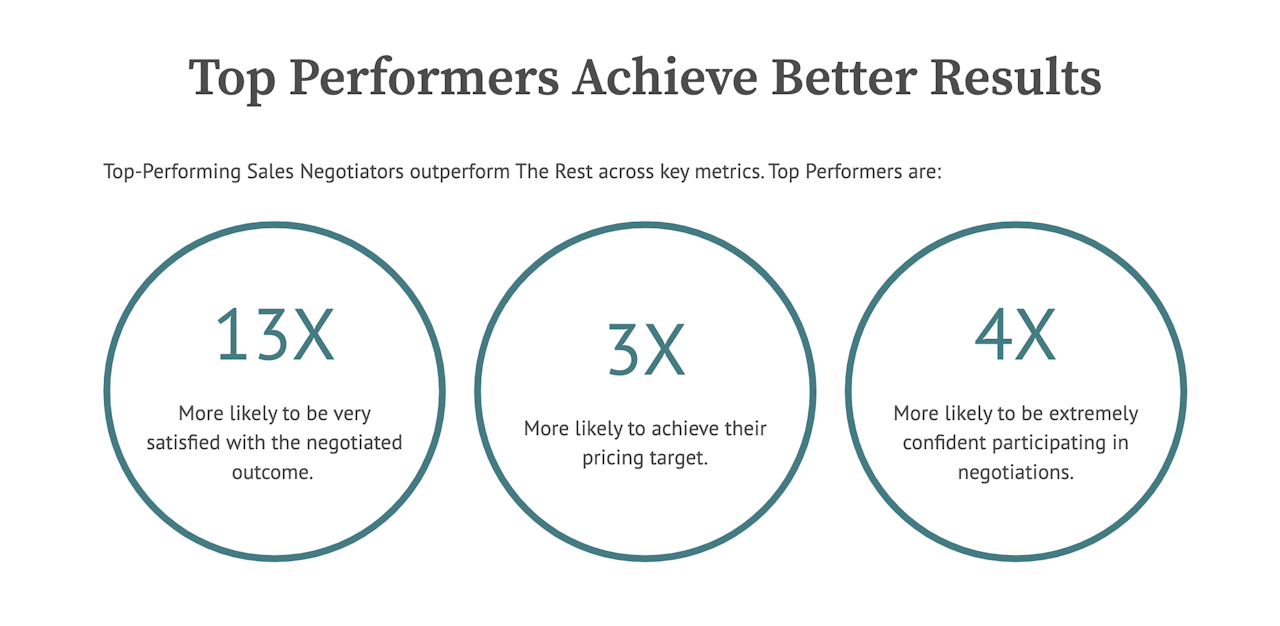
On a more nuanced level, sales negotiations also help strengthen the relationship between sales professionals and prospects or customers. The negotiation process gives buyers the opportunity to share their concerns and allows sellers to demonstrate their vested interest in helping address those concerns.
Sales negotiations help sales organizations close more deals, connect constructively with more buyers, and respond to sales objections (not just budget-based ones) more authentically and productively.
This framework can represent a departure from the way sales reps sometimes stereotypically think of sales negotiations. In fact, the negotiation doesn’t have to be a contentious or argumentative process, and negotiating does not automatically mean that the sale will be a wash.
In fact, quite the opposite can be true — if a seller has strong negotiation skills.
10 Essential Negotiation Skills for Sales Professionals
Successful sales negotiation takes experience and practice. It’s not a process that necessarily comes easily to every sales rep, and that’s okay. The process will become more comfortable over time as sellers have more real-world opportunities to hone the craft.
That being said, there are several “hard” and “soft” negotiation skills that sales reps can target and optimize as they continue to gain relevant experience.
1. Be Aware of Your Mindset
Even if you’re relatively inexperienced, and perhaps still intimidated by the negotiation process, don’t let that show.
Try reframing your mindset; the negotiation process exists to help buyers and sellers get to know one another’s needs better — not to cause tension or promote manipulation.
Go into the negotiation process with the expectation that sales negotiations help you uncover deeper buyer needs. Gaining a better understanding of these needs makes you a better seller, and makes it more likely that you can successfully close the deal.
2. Build Rapport and Trust With Emotional IQ
Emotional intelligence — sometimes referred to as EQ, the intelligence quotient’s emotional counterpart — is a skill that will come in handy for far more than sales negotiations.
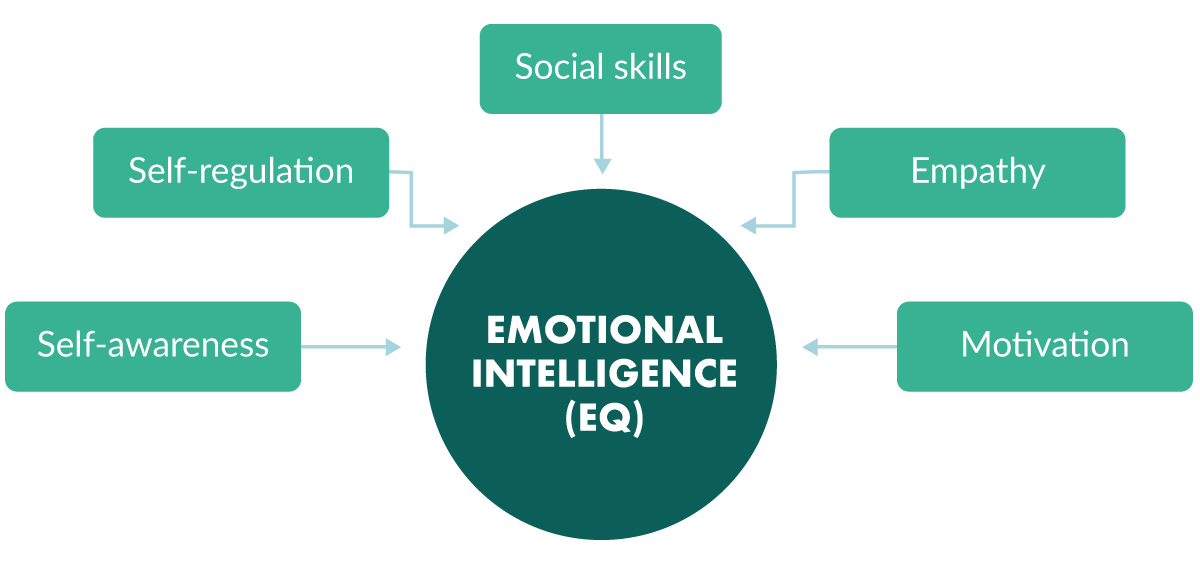
Developing a strong EQ helps sales reps “read the room,” so to speak, as they navigate negotiation conversations. Emotional intelligence can help sellers connect authentically with prospects as they collaborate to find the most beneficial deal for both parties.
3. Be Prepared
This should go without saying, but sales professionals should come prepared to each and every sales conversation. This means more than simply showing up on time ready to answer questions about your product.
Being prepared means, at the bare minimum, having a thorough understanding of your ideal customer profile (ICP) and buyer persona.

Beyond that, sales reps will be best served in negotiations if they enter the conversation with at least a preliminary understanding of the buyer’s specific desired contract outcomes.
This kind of data or insight can be pulled from sales qualification conversations, past deal experience with similar target accounts, and additional prospect research.
It’s better to go into the conversation knowing more about the prospect than you needed to know, rather than the other way around.
4. Study All Objections
Although most sales reps assume that negotiations are based solely on price, there are actually many variables that may come into play in a sales negotiation.
Objections that spur negotiations can be related to any of the contract terms or sales criteria. Here are five of the most common you’ll hear today:

It’s important that reps are aware of and prepared to respond to all of the many objections or sales hurdles that may come up during the conversation.
It’s even okay to go as far as scripting out some of these responses — so long as you don’t sound rehearsed in the context of an actual sales negotiation.
5. Familiarize Yourself With Industry Benchmarks and Standards
Buyers may not always be well-versed in the details of how your product matches up to its competitors when it comes to price or otherwise.
In other words, sticker shock on their end doesn’t necessarily mean that your offer is poorly-priced.
Any sales rep who may find themselves participating in a sales negotiation should be ready to share industry-wide benchmarks and data regarding price, performance, and value. These facts will help orient the buyer to how your product compares to the market’s offerings as a whole.
6. Take the Lead
Sales research has shown that sellers who lead the negotiation process by making the first offer are more successful than those who take a backseat.
This is thanks to a psychological principle called anchoring. According to the anchoring principle, humans are more likely to disproportionately rely on the first piece of information given to them (the “anchor”) when making decisions.
Sellers who make the first offer can “anchor” the buyer into a deal that’s highly favorable to business, with the expectation that there will be further negotiations and compromise.
Don’t worry, though, if the buyer beats you to it. There are ways around being beaten to the anchor.
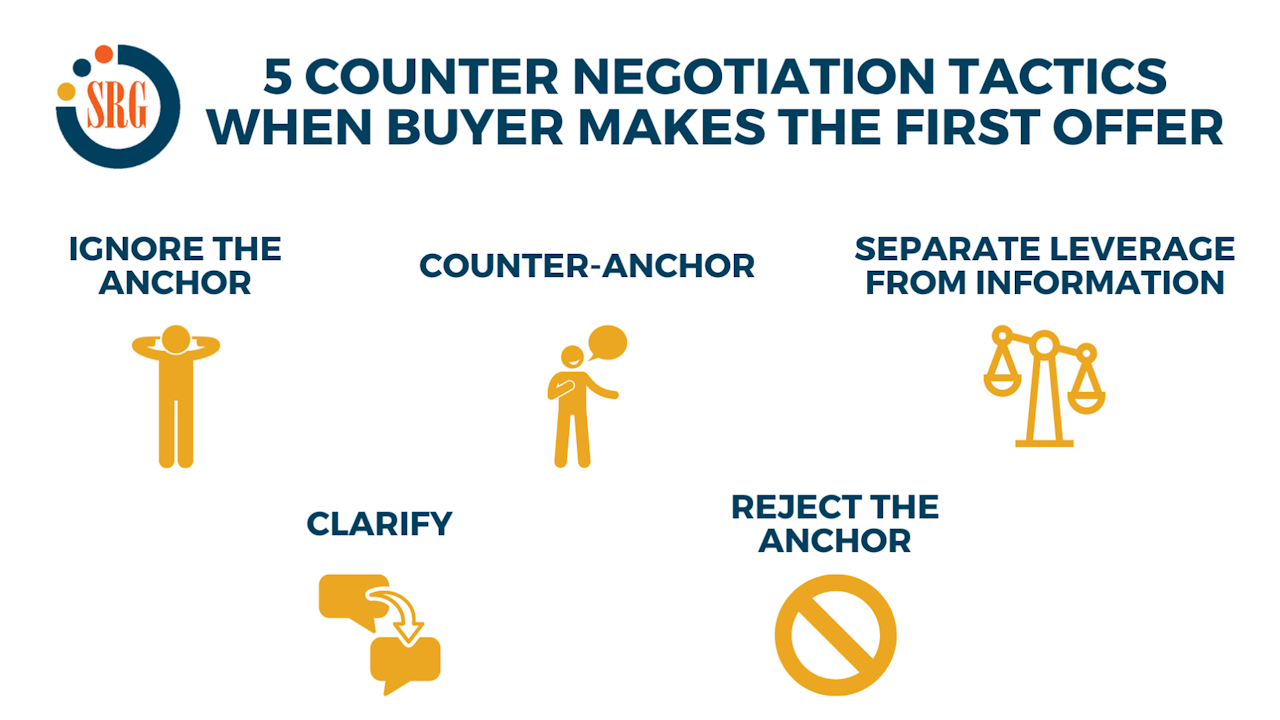
This is another great example of why it’s so important to be well-versed in industry benchmarks. They can help you reframe the conversation if the buyer anchors unreasonably.
7. Focus on the Value Gained… or the Opportunity Cost
Here’s another psychological principle that can boost your negotiation skills: humans are hard-wired to avoid loss.
So much of sales training focuses on demonstrating value to the prospect, but it can also be very effective to present what the prospect stands to lose if they forgo a deal. This is called “opportunity cost.”
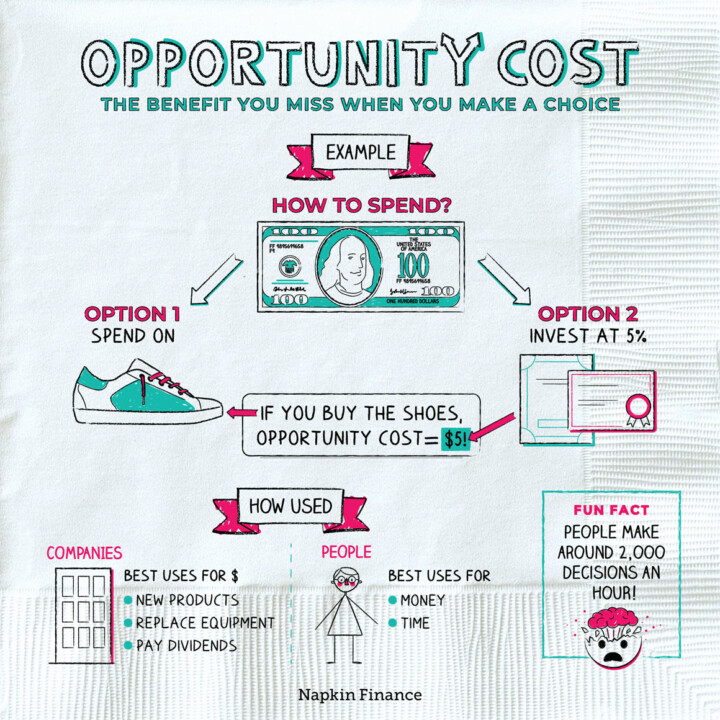
There’s a time and a place for this tactic, of course, and sellers will develop a “feel” for when to introduce it over time.
You don’t want to make the buyer feel pressured, or worse, threatened. But it’s okay to sometimes frame the value in terms of what they might be giving up by opting out.
8. Learn How to Trade Instead of Giving In
A subtle but extremely impactful part of negotiating is learning to make trades, rather than concessions.
If, for example, your prospect absolutely cannot sign a contract without a lower-cost investment, avoid giving in to a lower price without something in return. You could, for example, suggest a longer contract length, or a shorter customer support period.
The idea here is to ensure that the scales remain balanced throughout the negotiation process.
9. Reduce the Alternatives
It’s good to have in your back pocket some ways in which a competitor’s offer won’t work for a prospect.
Now, be careful here — this is not by any means a suggestion to badmouth specific competitors in a sales meeting. Don’t sacrifice your professionalism, and show that you confidently stand behind your offer without tearing others down.
But if you can subtly reduce the viability of the other offers on the table, it inherently makes your offer seem more attractive.
10. Know When to Walk Away
Research shows that the #1 thing all top negotiators have in common is that they’re willing — and know when — to walk away from a deal.
Ideally, most of your prospects will be genuine in their search for a mutually-agreeable sales process and deal terms.
That being said, though, there will always be people who try to push the limits too far. Learn how to spot unreasonableness, and cut ties (politely) as soon as you see it.
Time is a salesperson’s most precious asset, and it’s okay to protect it by ceasing negotiations that are destined to be unprofitable.
Ultimately, all of a sales rep’s negotiation skills should be aimed at striking a balance between showing the buyer that you care about their needs and securing a successful deal for the organization.
Sales Negotiation Tips
Regardless of your level of experience with sales negotiations, there are a few best practices to keep in mind throughout the process that will help you move the conversation forward productively.
Identify Decision-Makers
It’s a fool’s errand to engage in negotiations with someone who doesn’t have the authority to secure the deal. Make sure you know who the decision-makers are at each organization, and save your negotiating until you reach them.
Practice Active Listening
Even if you’re unable to concede what the prospect is asking for in a negotiation, active listening can go a long way in helping them feel like you care about their needs.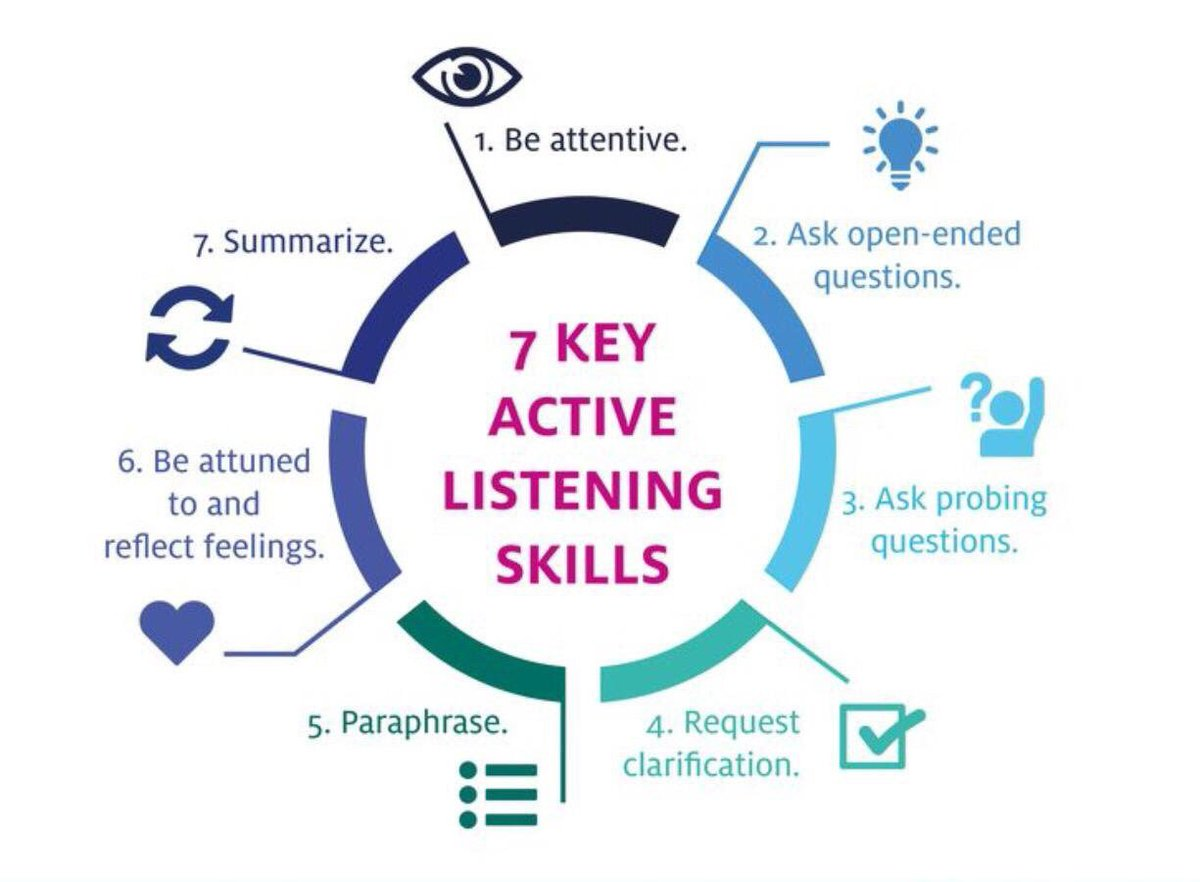
Active listening is also an important skill for strengthening your EQ.
Stay Positive
Remember, negotiations shouldn’t be akin to a debate.
Ultimately, successful negotiations are ones in which each side becomes more educated about one another’s needs and, ideally, works to “give a little” to meet them halfway. Keep a positive and open mindset throughout the process.
It’s okay to trust, at least initially, that you and the prospect have the same goal: a mutually-beneficial deal.
Set an Agenda
Top-performing sales negotiators know that one of the keys to success in this process is taking control of it.
Making the first offer is one way to do that; setting and sticking to an agenda is another.
As the seller, it’s up to you to outline the scope of the conversation with the prospect. Not only does this help you anticipate what to expect, but it also shows the prospect that you have command of the situation and that you respect their time.
Manage Emotions
Speaking of seller responsibilities, it’s also incumbent upon the sales rep to be the “emotional ringleader” of the entire process — for both parties.
It’s up to you to pay careful attention to the tone of the conversation, and the emotions (even subconscious ones) that may crop up throughout the negotiation process.
Most importantly, sales reps themselves should never show outward frustration, anger, embarrassment — any negative emotion, really. They also need to be aware, though, of their counterpart’s feelings and redirect the conversation if it starts to turn sour.
Example of a Successful Sales Negotiation
It’s somewhat challenging to choose just one single example of a successful sales negotiation. Each deal, each prospect, each offer, and each seller are so unique that there are virtually limitless ways to ensure you (and the prospect) come out on top after a negotiation.
That being said, let’s take a look at an imaginary, but realistic sales negotiation scenario that encompasses some of the tips and skills outlined in this article.
Seller: The standard plan starts at $109 per month, and includes a year of free live access to our 24/7 customer support team.
Prospect: That’s a bit more than we were hoping to spend. How long is the contract?
Seller: I hear you, I understand you’re working with a particular budget. For reference, the average cost for offerings similar to ours is about $102 per month, and most don’t offer [YOUR PRODUCT’S USP]. But it’s important that we find the solution that fits all of your needs. Our typical minimum contract is two years.
Buyer: Oh, wow. I didn’t realize this software was such an investment. I guess it’s a good value when you put it that way, but I just don’t know if we can shore up all of this cash right now.
Seller: That makes sense. I think there are a couple of ways we can work around this. We can move forward with a month-long free trial, with the expectation that you’ll then sign a two-year contract. Or, we can reduce the contract length today and sign a lower-risk, one-year term so you can gauge whether it’s worth a longer-term investment for you. How does that sound?
Buyer: That certainly takes a lot of pressure off! I do have the authority to spend about what a year would cost. Let’s move forward with that arrangement. I appreciate you working with me on that.
The seller now has ample opportunity to impress their new client with onboarding, the customer success team, and — of course — the product itself, making it more likely that they’ll go on to sign the full two-year contract.
Do you enjoy sales negotiations, or are they challenging for you? What tips can you apply to the negotiation process the next time you’re involved? What would be the ideal outcome of your next negotiation?
Get sales tips and strategies delivered straight to your inbox.
Yesware will help you generate more sales right from your inbox. Try our Outlook add-on or Gmail Chrome extension for free, forever!
Related Articles
Casey O'Connor
Casey O'Connor
Jenny Keohane
Sales, deal management, and communication tips for your inbox

